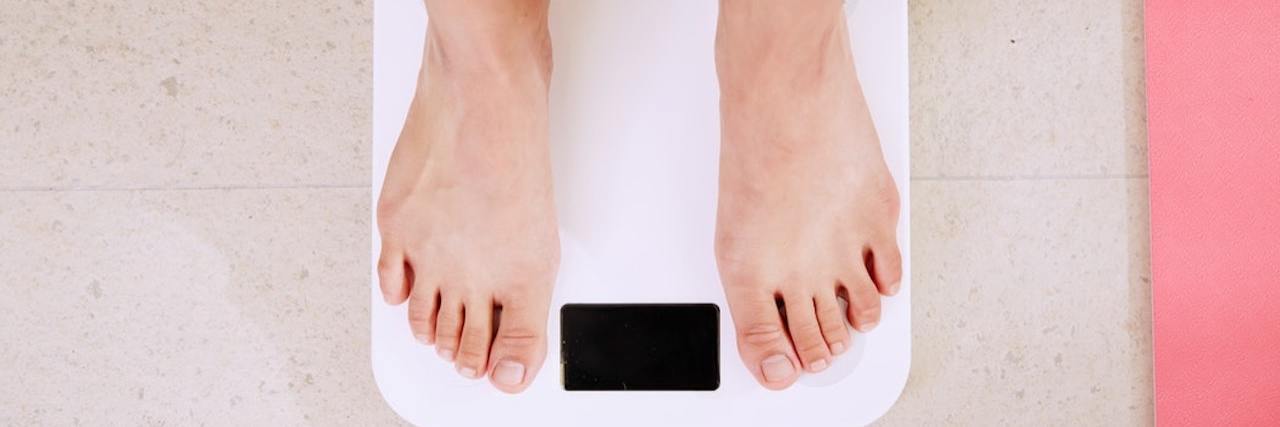Being Overweight Doesn't Make My Eating Disorder Less Serious
Editor's Note
If you live with an eating disorder, the following post could be potentially triggering. You can contact the Crisis Text Line by texting “NEDA” to 741741.
I am classified as obese. I’m at high risk for joint problems, cardiovascular disease, diabetes… The list goes on (and on and on), and I can feel it every day. I wake up in the mornings and I feel how unhappy my body is with me; it creaks and cracks just like an old house.
I’m never quite comfortable. I twist and turn at night, trying to find a position that doesn’t put too much weight on any part of my body. My back gets worse and worse over time as I struggle to support my weight, and my breasts get heavier and harder to support. Stairs knock the wind out of me, my legs ache walking to the car — goodness forbid I have to walk any further than that.
Right now, I’m essentially carrying over double the weight that my body was designed to support. It’s painful, frustrating and I hate it. On top of the pain and discomfort, there’s the repeating thought in my brain that I did this to myself. No one force fed me, I don’t have a thyroid problem; this is all about my disordered relationship with food.
I don’t know if I’ve ever had a “good” relationship with food. For so long, I’ve seen it as a source of comfort and calmness when I most desperately needed it. Binge eating has been my primary coping mechanism for years and it shows on my body. Even now, as I’m binging less and recovering more, it still shows on my body. Although I’m learning new skills, repairing my relationship with food and eating healthier, my binge eating disorder is reflected all over my body.
Years of binging at least once per day had me gaining weight at a troubling pace. Rapid weight fluctuation is often seen in active eating disorders, but because my ED had me gaining weight, I’m not seen as a victim of an illness; I’m just weak-willed.
The negativity surrounding bigger bodies won’t be news to any of you, I’m sure. People who are overweight are often associated with laziness, weak will and personal flaws, and that my eating disorder wasn’t acknowledged or diagnosed for years.
For years, my weight was an issue. For years, I struggled to control it. For years, food was my comfort, my tranquilizer and my tie to the world.
In the midst of panic? Food.
Had a bad day? Food.
Anxious for tomorrow? Food.
Can’t sleep? Food.
But no one saw it as a mental health issue, including me. It took me a long time to come to terms with the fact that it wasn’t actually a personal flaw of mine, but the result of a disordered relationship with food. But even since I’ve accepted it, it’s hard to talk about it with others. I share a lot about my mental health. I write a blog and try to do my part to support others and be an advocate. But my eating disorder feels different. Even calling it an eating disorder feels wrong, like I’m not allowed to use the term.
Fatness is so strongly correlated to personal flaws that those of us who gain weight from our eating disorders are offered less help, less support and less sympathy. An article written by two UCLA scholars discusses two case studies: one of a child likely affected by binge eating disorder, and another about a child diagnosed with anorexia nervosa. While the parents of the child with anorexia were given sympathy while they struggled to find help for their daughter, the single mother of the child with BED was at risk of losing custody of her child due to accusations of neglect. The article says, “News media treats anorexics as victims of a terrible illness beyond their and their parents’ control, while obesity is caused by bad individual behavior.”
Though other factors like race, gender, social status, income and familial structure can definitely be discussed as factors in these cases, my experience being a bigger size has shown me that there are different opinions of people with eating disorders based on their BMI.
My eating disorder is seen as an excuse, not a cause for my weight gain. It’s seen as a way to deflect my supposed personal responsibility. My eating disorder is killing me slowly, so it’s somehow less serious, less legitimate. In my experience, weight loss is assumed to take dedication and strength, where gaining weight is a sign of weakness and lack of control. On its surface, I can see where that comes from: most of us like food and don’t want to have to “miss out” on more of the good stuff. But when it comes to eating disorders, it’s just not fair to see it as anything other than a disorder. It’s not strength, but it’s not weakness either; it’s just a disorder.
I can’t compare my fight to the fight of others with eating disorders, but I can tell you that it’s been a hell of a fight for me. My fight has been hard. It is a struggle. It is not about lack of motivation or willpower and it is not some flaw inherent in me that has caused me to not care enough to try — it’s just a goddamn fight.
I am fighting for my health. But because I have a bigger body, no one believes me. That needs to change.
This piece was originally published on Sheena’s Place Client-Centred Blog.
Unsplash via yunmai

